|
For fans of classic era Hong Kong martial arts cinema, see if any of this has a familiar ring. Following a title sequence in which the lead players display their fight moves with aplomb, a young man named Jin Zheng Zhi (Carter Wong) is chased by what looks like a dangerous mob. When his progress is halted by a second group he is forced to face his pursuers, the leader of whom (Chin Yuet-sang) wants to know why this lowly Korean was nosing around the Japanese martial arts school. When Jin defiantly argues that the school is on Korean territory and he thus should be entitled to enter, one of the group attacks him, a move Jin easily counters using Taekwondo. For the lead pursuer, the simple fact that Jin practices this Korean martial art is proof that he is anti-Japanese and attacks him too. Yep, we're in pre-WWII Korea under Japanese occupation, and When Taekwondo Strikes (actually When Tae Kwon Do Strikes on the film itself) is another entry in the prestigious 'Evil Japanese' school of martial arts actioners.
Realising that he is heavily outnumbered, Jin makes a break for it with the Japanese in hot pursuit, and takes refuge in a Christian church whose French pastor has the not very French name of Father Lewis. He's played by one of the film's producers, Andre Morgan (, and is doubtless intended to look older than he does, at least if the silvery beard and wig in which he's been dressed is anything to go by. When the Japanese march cockily in a short while later in search of the now invisible Jin, the pastor pays them no heed. When the mob leader questions him about the errant Korean, he completely ignores him and continues to mouth his silent prayers. Frustrated at this uncooperative westerner, the leader makes a move to slap him, but one look from the pastor unexpectedly stops him in his tracks. Instead, the Japanese move around the praying partitioners, yanking heads up to check their faces in their fruitless search for Jin. The leader orders a group of praying women to raise their heads, one of whom turns out to be a young and innocent-looking western girl whom we soon learn is Father Lewis's niece Mary (Anne Winton). And when I say innocent-looking, I really mean it. With her wide eyes and peasant headscarf, she has an almost angelic quality, and if cast in an Edwardian drama, she would be the quiet and retiring younger sister of the more outgoing love of the leading man. She certainly proves attractive to this Japanese bandit, but before he can act on his sleazy impulses, his men uncover another Korean man (Jhoon Rhee), whom the leader instantly suspects of harbouring Jin. When the man also refuses to answer their questions, the leader furiously slaps his face, and being a good Christian, he turns the other cheek, which the leader takes as a cue to start slapping him further. It's then that Father Lewis pipes up to inform them that the man is his gardener, but as far as the leader is concerned he's a colonial slave of the Japanese empire, and he can thus do anything he wants with him. To emphasise the point, he slaps the gardener a couple more times, then proclaims himself God and goes to punch the pastor squarely in the mouth.
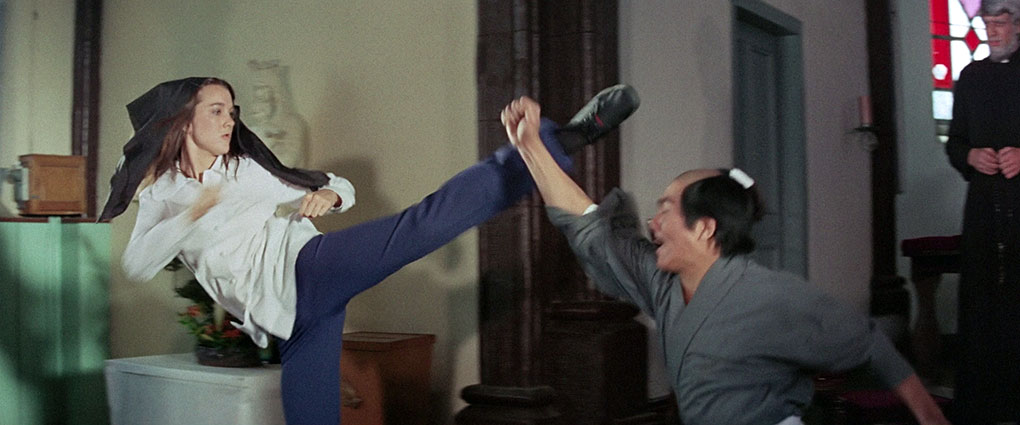
Up to this point, the film has played largely to 1970s anti-Japanese martial arts movie convention, but it then delivers what for me was a belter of a surprise. From the ferociously defiant look on the gardener's muscular face, I was fully expecting him to step in here and protect his employer. What happens instead is the innocent-looking Mary grabs the leader's hand instead. He responds by laughing and reaching forward to stroke her face, which earns him a sharp and defiant slap. When he angrily orders his men to take them all away, however, they get the surprise of their lives. Mary, it turns out, is no shy retiring flower but a ball of highly skilled Taekwondo kicks and punches. As she lets rip on the Japanese, the previously secreted Jin joins the fray, and the two give the mob a serious pasting. As they chase the last of them from the church, the gardener orders them to stop and they immediately comply and return to provide some dearly needed answers to the confused and concerned Father Lewis. It turns out that the man he had employed as a gardener is actually Li Jundong, the leader of the Korean resistance movement and a man that the Japanese are desperate to capture. Unbeknown to her Uncle, Mary has been studying Taekwondo under his tutorship, as has Jin, none of which impresses the disapproving pastor.
With the Japanese set to set imminently return, Li tries to convince Father Lewis to leave with them, but the silly old Christian to too wedded to his church to leave. Mary and Jin thus make their escape, and when the Japanese turn up as predicted – this time led by an altogether tougher individual (the ever-wonderful Sammo Hung) – they immediately start slapping Father Lewis about. That's when Li appears and reveals his true identity to the oppressors. An attempt to grab him, however, falls flat when Li's rock-solid stance makes it impossible for Sammo to drag him off his feet, a simple but rather neat way of suggesting Li's considerable strength. It's then that we get to see what Li Jundong can do, as he takes on the boss man in a bristling battle that pits Sammo Hung against the man who first brought Taekwondo to America. As the Japanese flee, Father Lewis urges Li to do likewise, but is naively unworried for his own safety. "No matter how savage they are, I doubt that they'll mistreat me," Father Lewis tells him. "I'm a foreigner. I'll be protected by the consulate." Obviously, this particular Christian pastor is unaware that he is in a martial arts movie where the bad guys are capable of just about anything. Thus, when Mary and Jin join Li at his training camp in the mountains, Father Lewis is dragged off by the Japanese and tortured on restraints that symbolically crucify him. Oh, the irony.
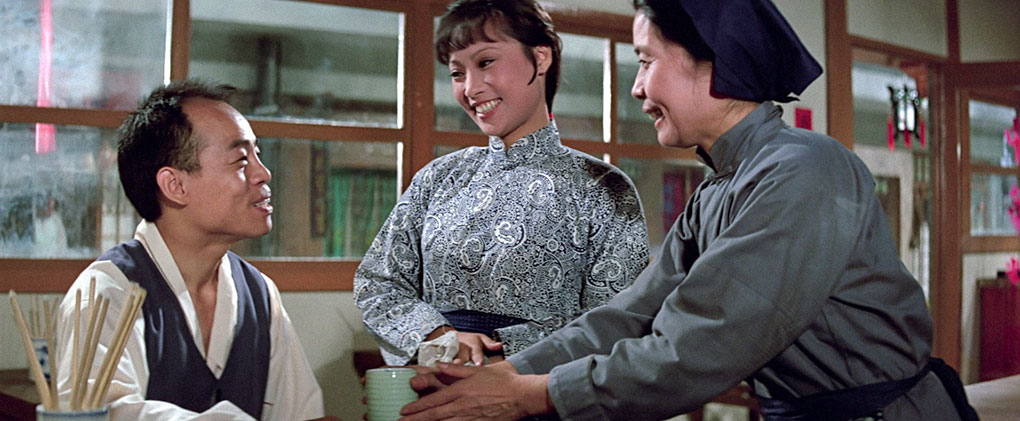
At this point, we're almost a third of the way in and have yet to meet what for the younger me would have been its biggest pull. She finally appears when Li riskily pays a visit to a small restaurant run by Chinese immigrants Huang Li-chen and her mother to ask Huang to visit the church to check on Father Lewis. Huang, of course, is played by Angela Mao, and as I've probably made clear before, for me Mao was as close 70s martial arts cinema came to a goddess in human form. She was always an arresting presence, and as a screen fighter was one of the very best that Hong Kong had to offer. Thus, when she finds no trace of Father Lewis and is challenged by the same Japanese mob that were chasing Jin earlier, I was just itching for her to respond by soundly kicking their arses. When this inevitably happens, the leader of the group – the same one who learned nothing from the slaps and kicked dished out by Mary – gets the worst of it by far, with Huang continuing to beat him mercilessly as he attempts to crawl up stairs, then throwing him down them and beating him relentlessly to death. Unfortunately for her, one of the goons sees her leave the church and follows her home, and when another band of Japanese show up to arrest her for killing one their men, she unexpectedly agrees to accompany them. This proves to be a ruse to lead them out into woodland and far from her mother's shop, where she gives their leader such a violent pasting that this companions, instead of attacking her as expected, all run away in terror. Oh, I so love this woman.
Things escalate quickly from here, particularly once Li decides to offer himself up as a prisoner in exchange for the seriously battered Father Lewis, an act of surprisingly naivete on his part that backfires badly on both individuals, but does galvanise Li's followers and drive the extended final act. The Japanese continue to be behave like evil Bond villain henchmen, good and innocent people die unjustly at their hands, the noble Li suffers for his convictions but nobly resists every dastardly effort to force him to comply, and Jin and Mary act impulsively while Huang remains the voice of reason at potential conflict flashpoints. In the end, she's overruled by the desperation of her companions to assist their master, which gives rise to a lovely moment when Li, after berating Mary and Jin for attempting his rescue, lets out a small satisfied smile when Huang shows up to really give the Japanese cause to regret their actions.
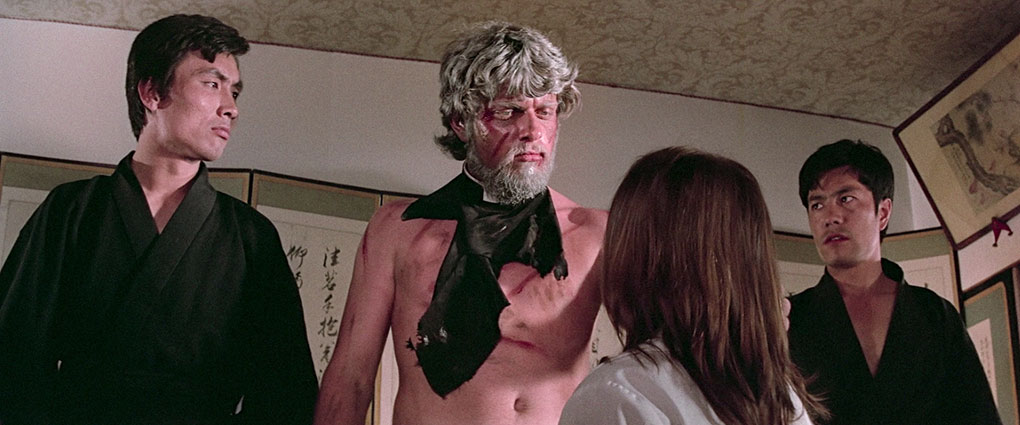
There's a strong argument to be made for seeing When Taekwondo Strikes as a companion piece to the previous year's Hapkido. Both were directed by Huang Feng and produced by Raymond Chow, both star Angela Mao, Carter Wong and Sammo Hung, both feature action choreography by Hung and have many of the same key crew members, both are built around a titular Korean martial art, and both are set partially in Korea under Japanese occupation. Hapkido was always one of my absolute favourite entries in the first wave of martial arts films, and when it came to UK DVD courtesy of Hong Kong Legends back in 2006, it played even better than I remembered. Thrillingly, When Taekwondo Strikes is every bit its equal, in its brisk storytelling, its likeable trio of young protagonists, and most of all its Taekwondo combat. As choreographed by Hung and performed by the hugely talented cast and team of stunt performers, every fight here is furious, brutal, and electrifyingly staged. All of the lead players are on bristling form here, and while Mao does tend to steal the show, Carter Wong proves again that he's a force of speed and agility to be reckoned with, and Anne Winton really impresses as the angelically faced Mary, not just in the quality of her Taekwondo skills but also her easy charisma as an actor. After allowing Jhoon Rhee to show what he can do in the early church fight, the decision to keep the Father of American Taekwondo prisoner for much of the film is a bit of a tease, but when he breaks free in a dynamite climax it proves worth the wait, and watching all four lead characters in simultaneous action is an absolute treat.
As with Hapkido, director Huang Feng demonstrates his skill at cinematically showcasing the martial artistry, peppering his perfect-angle coverage with handheld shots that reflect the energy of the action and place us in its midst, and the odd unexpected angle or slow-motion flourish to emphasise and impact or the grace of a move. Once again, he is aided immeasurably in his task by cinematographer Danny Lee's mobile camera and Peter Cheung's sharp editing, which combine to accelerate the pace without muddying the skills of the performers. As with the earlier film, you'll again have to swallow the portrayal of what feels like an entire nation of people as irredeemably monstrous, but even as someone who regularly visits and adores Japan and its people, I'm aware that this prejudice was born of the bitter experience of living under sometimes unspeakably brutal Japanese occupation.
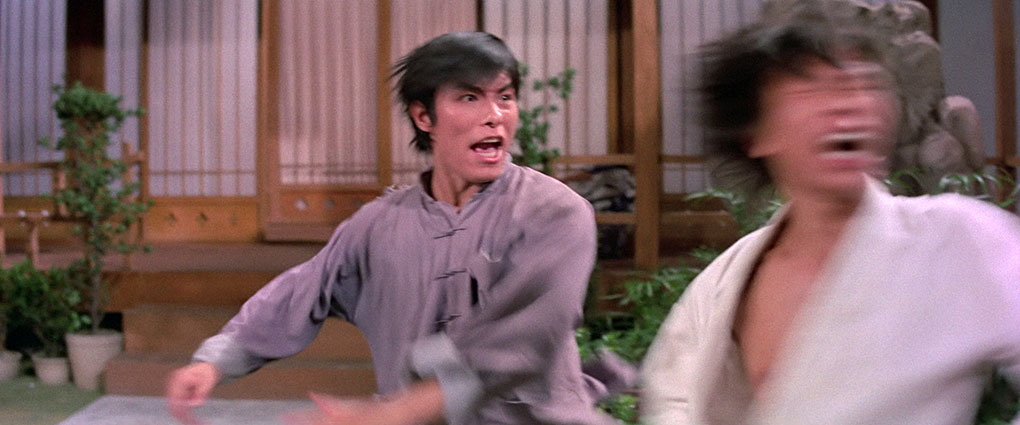
For fans of old-school Hong Kong martial arts cinema, When Taekwondo Strikes should be considered essential genre cinema, as should its predecessor Hapkido, which is still available in a superb two-film Blu-ray box set with Lady Whirlwind (1972), also from Eureka. The story pushes all the expected genre buttons, with an army of evil bad guys, noble heroes, impulsive apprentices, and acts of appalling cruelty whose sole narrative purpose is to fire up the protagonists with an unstoppable need for revenge. More unusual is the film's equal opportunities policy, with combatants shown to be of equal standing and skill regardless of their sex or race. The fights, of course are the film's true raison d'être, and they are some of the best the genre has to offer, executed to perfection by a terrific and highly skilled cast. Oh, and true to tradition, the film borrows music liberally from other sources, including Bernard Herrmann's instantly recognisable title theme for North by Northwest, not a tune I ever expected to hear serenading a gang of officially sanctioned Japanese thugs as they march purposefully down a busy Chinese street in search of two fugitives.
Sourced from a brand new restoration of the original Hong Kong cut of the film and framed in the original aspect ratio of 2.40:1, the 1080p transfer on Eureka's Blu-ray maintains the impressively high standard the label has set for its first and second wave martial arts movie releases. The image quality is downright pristine here, with sublimely graded contrast, a lively colour palette, and a pin-sharp detail. Any former traces of dirt, dust or damage have been removed, and the image sits rock-solidly in frame with not a hint of jitter. Just lovely. I've said this before and will doubtless do so again, but such restorations feel especially miraculous for a film that neither its makers not distributors thought would have a shelf live beyond its first cinema run, and for years was only available on faded and glitchy pirated VHS copies, with a cropped print and a crackly English language soundtrack. All hail Eureka!
There are two soundtracks available, the original Mandarin and the English dub that would have accompanied the film's UK and US theatrical releases. Both tracks are post-dubbed, with an international cast delivering their lines in their native language (except Andre Morgan, who I gather was fluent in Mandarin), but the majority of the cast is Chinese and the Mandarin track is usually a far better fit, with Anne Winton the only one who is synchronised to the dialogue on the English language track. Both are Linear PCM 2.0 mono, with the Mandarin encoded at a higher bitrate than the English language dub, something reflected in the slightly more robust audio quality of the Mandarin track. Inevitably, both tracks show their age in the narrow tonal range, although the music and contact wallops have noticeably more oomph on the Mandarin track. There's a very faint hum in the background of the Mandarin track that you'll only really notice if you crank up the volume (which you will, of course), and a more noticeable hiss underlying the English track. Otherwise, both soundtracks are in good shape, with dialogue always clear and no obvious signs of damage.
Optional English subtitles are provided for the Mandarin soundtrack.
Audio Commentary by Samm Deighan
In a rare break from the Eureka martial arts favourites Frank Djeng, Mike Leeder and Arne Venema, the commentary duties here have fallen instead solely to writer and film historian Samm Deighan, who did such a fine job on this label's release of Lady Whirlwind. It's a similar story here, with Deighan providing a ton of detail on the film, its performers, its makers, the period in which the story is set, the true-life actions of the Japanese occupiers, and a good deal more. She intriguingly deconstructs how the fights impact on the development of the main characters, notes that Mao is taken seriously from the off – no "how did that small girl beat that big man?" nonsense here – and highlights the unusually feminist and multicultural aspects of the film. As someone who was wondering why the clearly talented Anne Winton had not made more movies (she has only two credits on IMDb), Deighan's revelation regarding the terrible fate that later befell her gave me a genuine shock.
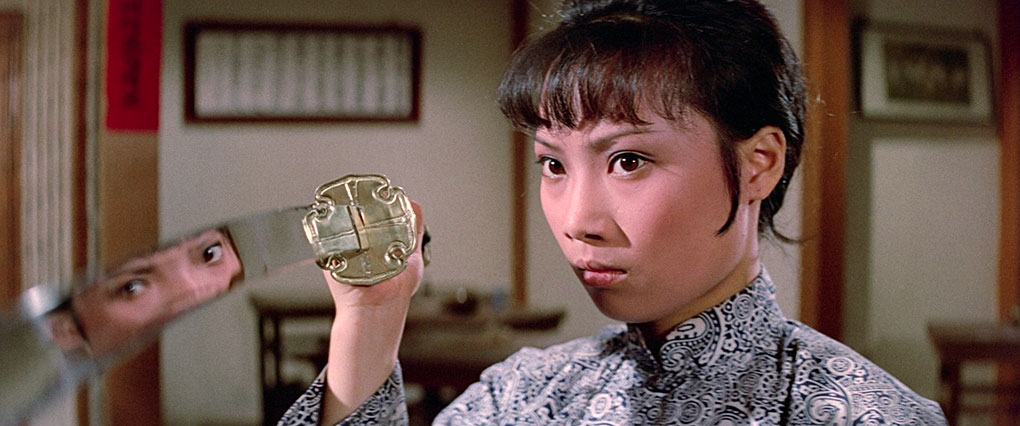
The Best of Martial Arts Films (91:19)
When it comes to special features, this is a bit of a doozy, being a feature-length (seriously, look at that running time above) look at the appeal and highpoints of martial arts cinema, from its early Hong Kong stars to the American and European performers who followed in their wake. Made in 1990 and presented and narrated by the wonderful John Saxon, it does highlight several of the key Hong Kong players, but in doing so misses out a whole ton of others, including one of the stars of the main movie on this disc. That said, Saxon does state at the end that the films featured here are only the tip of the genre iceberg, which is fair enough. In its later stages, the film primarily showcases western performers, including a sprinkling who never found stardom and were largely confined to supporting roles. Yet while I'd quibble with a title that doesn't even give some of the genuinely finest genre films and actors a mention, as a sampler to draw relative newcomers to the genre, it does its job rather well, primarily by showing entire fight sequences instead of the usual brief clips. It's a shame not all are identified by title, but most of them are, and the performers who are included all get decent coverage, and some are even interviewed about their craft. These include Sammo Hung (spelt 'Samo' here), Jackie Chan and Cynthia Rothrock, as well as Enter the Dragon and Battle Creek Brawl director Robert Clouse. Being aimed at a western audience, all of the clips and the interview with Sammo Hung are dubbed into English.
Billy Chan Interview (20:58)
A new interview with stuntman and actor Billy Chan, who replies to captioned questions about his career and specifically his work on When Taekwondo Strikes. He talks about the working methods of different action directors, having to learn Taekwondo specifically for this film, why good stuntmen are popular with actors, how Huang Feng and Sammo Hung worked together, why foreign fighters often don't know how to optimise their moves for the camera, and more. The interview is conducted in Cantonese with removable English subtitles.
Original Theatrical Trailer (3:55)
Four minutes of non-stop fighting grace this original Hong Kong trailer, whose opening caption is translated unexcitingly as "a solemn announcement from Golden Harvest." Includes the North by Northwest title music.
US Trailer #1 (1:27)
A grainy, all-action US trailer that has the film retitled Sting of the Dragon Masters, and of the cast it only name-checks Angela Mao, who apparently is part of "the chock-sock team that'll knock you out, and stomp you to pieces."
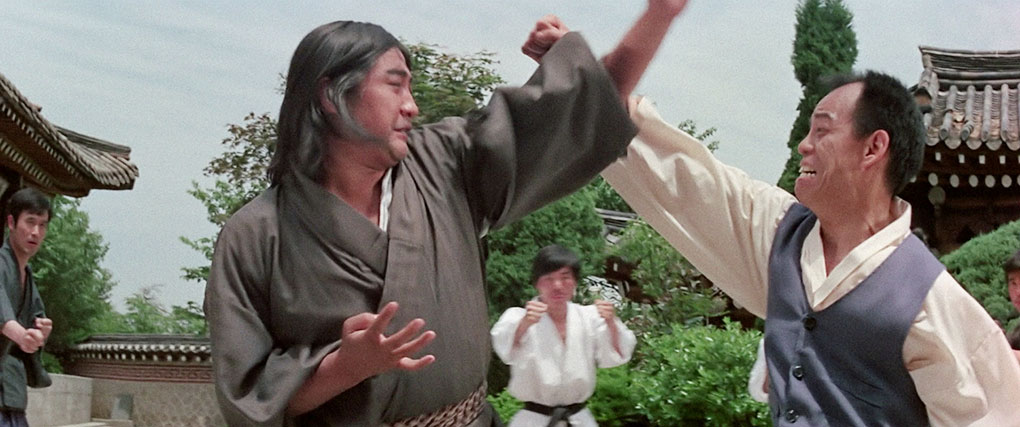
US Trailer #2 (2:56)
The original title is restored for this longer and similarly action-packed trailer, where Jhoon Rhee headlines alongside Anne Winton and Angela Mao, but poor old Carter Wong doesn't even get a mention.
UK Trailer (3:34)
An extended version of the second US trailer, complete with the same captions but minus the narrator.
Also included is a Limited Edition Collector's Booklet featuring new writing by James Oliver, but this was not available for review.
A splendid and impressively grounded (no wire work here) example of classic era Hong Kong boxer movies at their best, and an essential companion to the same team's Hapkido of the previous year. Eureka has once again done the film proud, with a terrific restoration and transfer, an always interesting and informative commentary track, a welcome interview with stuntman Billy Chan, and a feature-length introduction to martial arts cinema that is jam-packed with top-notch fight sequences. Highly recommended.
|